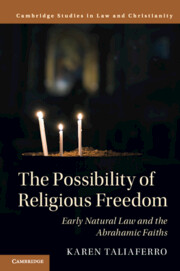Book contents
- The Possibility of Religious Freedom
- Law and Christianity
- The Possibility of Religious Freedom
- Copyright page
- Dedication
- Contents
- Preface
- Acknowledgments
- 1 Religion and Law in Late Modernity
- 2 Antigone: The Tragedy of Human and Divine Law
- 3 Maimonides’ Middle Way: Teleology as a Guide for the Perplexed
- 4 Between Sharīʿa and Human Law: Ibn Rushd and the Unwritten Law of Nature
- 5 Arguing Natural Law: Tertullian and Religious Freedom in the Roman Empire
- Conclusion
- Epilogue
- Bibliography
- Index
3 - Maimonides’ Middle Way: Teleology as a Guide for the Perplexed
Published online by Cambridge University Press: 07 October 2019
- The Possibility of Religious Freedom
- Law and Christianity
- The Possibility of Religious Freedom
- Copyright page
- Dedication
- Contents
- Preface
- Acknowledgments
- 1 Religion and Law in Late Modernity
- 2 Antigone: The Tragedy of Human and Divine Law
- 3 Maimonides’ Middle Way: Teleology as a Guide for the Perplexed
- 4 Between Sharīʿa and Human Law: Ibn Rushd and the Unwritten Law of Nature
- 5 Arguing Natural Law: Tertullian and Religious Freedom in the Roman Empire
- Conclusion
- Epilogue
- Bibliography
- Index
Summary
Chapter Three moves into the first analysis of divine, natural, and human law in the context of a religious tradition, specifically, medieval Judaism. Maimonides’ philosophical rendering of the nature of law and its link with nature itself suggests how divine law might remain integral even in the face of changing human circumstances. To Maimonides, all of the commandments of the Torah can be reduced to two principles: the betterment of soul and the betterment of body. This teleological approach to divine law allows human reason to interpret the rabbinic (divine) law in ways that would ease the conflict of human and divine law. Still, to Maimonides, this was necessarily an exercise bound by nature – “the Law, though not a product of Nature, is nevertheless not entirely foreign to Nature” (Guide II chapter 40) – which suggests the roots of a Maimonidean natural law.
- Type
- Chapter
- Information
- The Possibility of Religious FreedomEarly Natural Law and the Abrahamic Faiths, pp. 61 - 82Publisher: Cambridge University PressPrint publication year: 2019

